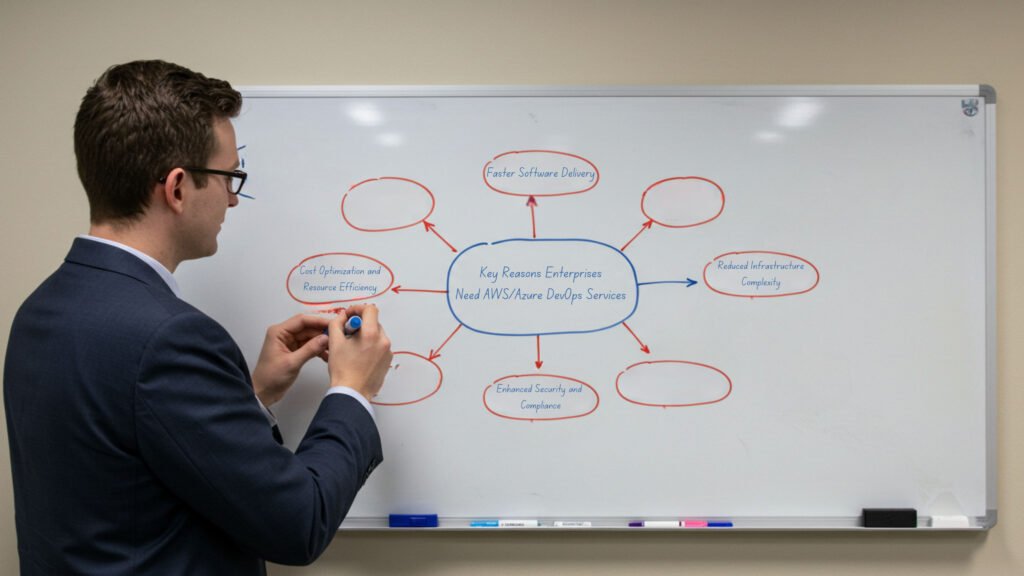In today’s fast-paced digital landscape, enterprises are under immense pressure to deliver high-quality software quickly, efficiently, and securely. DevOps has emerged as the key enabler of this transformation, integrating development and operations to streamline workflows, automate processes, and enhance collaboration. However, managing DevOps infrastructure in-house can be complex, resource-intensive, and costly. This is where AWS/Azure DevOps Services come into play—offering enterprises scalable, secure, and automated solutions to accelerate software delivery while reducing operational burdens.
This guide provides a deep dive into how AWS and Azure DevOps Managed Services empower organizations to optimize their software development lifecycle (SDLC). From CI/CD automation and infrastructure as code (IaC) to security, compliance, and monitoring, we explore how these services help enterprises enhance agility, reliability, and efficiency. Whether you’re looking to migrate to the cloud, modernize applications, or streamline IT operations, understanding these managed DevOps solutions is crucial for achieving digital transformation at scale.
What are DevOps managed services?
DevOps managed services refer to outsourced solutions that help enterprises implement, manage, and optimize their DevOps practices using cloud platforms like AWS and Azure. Instead of handling DevOps infrastructure, automation, and deployment pipelines in-house, organizations leverage managed service providers (MSPs) or cloud-native managed services to streamline operations, enhance scalability, and reduce the complexity of maintaining DevOps environments.
These services encompass a wide range of capabilities, including continuous integration and continuous deployment (CI/CD), infrastructure automation, monitoring, security compliance, and incident management. By using DevOps managed services, enterprises can focus more on innovation and development while relying on experts to handle operational challenges.
Key Features of DevOps Managed Services:
- Automated CI/CD Pipelines – Streamline software development and deployment processes with automated build, test, and release cycles.
- Infrastructure as Code (IaC) – Provision and manage infrastructure using code-based automation, ensuring consistency and repeatability.
- Scalability and High Availability – Ensure seamless scaling of resources to handle workload fluctuations efficiently.
- Security and Compliance – Implement security best practices, vulnerability management, and regulatory compliance automation.
- 24/7 Monitoring and Incident Management – Proactively monitor application performance, detect anomalies, and respond to incidents in real time.
- Cost Optimization – Optimize cloud spending by managing resources efficiently and avoiding unnecessary overhead.
DevOps managed services allow organizations to adopt modern development methodologies without the need for extensive in-house expertise. Whether enterprises use AWS DevOps Services like AWS CodePipeline or Azure DevOps Services like Azure Pipelines, these solutions help businesses achieve faster deployments, better collaboration, and improved operational efficiency.
Why enterprises need AWS/Azure DevOps services
In the competitive digital era, enterprises must deliver software faster, improve operational efficiency, and ensure security without compromising quality. Managing DevOps in-house requires significant investments in infrastructure, skilled professionals, and automation tools, which can be challenging for many organizations. This is where AWS and Azure DevOps managed services become essential. These services provide a scalable, automated, and cost-effective way to streamline development, deployment, and IT operations while offloading complexity to cloud providers.
With our AWS/Azure DevOps Consulting Services, enterprises can automate CI/CD pipelines, ensure security compliance, and optimize cloud costs.
Key Reasons Enterprises Need AWS/Azure DevOps Services

1. Faster Software Delivery with Automated CI/CD Pipelines
DevOps managed services in AWS and Azure enable enterprises to automate the entire software development lifecycle (SDLC). With tools like AWS CodePipeline and Azure Pipelines, organizations can:
- Automate code integration, testing, and deployment.
- Reduce manual errors and enhance release velocity.
- Deploy applications with minimal downtime using blue-green or canary deployment strategies.
2. Reduced Infrastructure Complexity with Infrastructure as Code (IaC)
Manually managing IT infrastructure can lead to inconsistencies and inefficiencies. AWS CloudFormation and Azure Resource Manager (ARM) allow enterprises to:
- Define infrastructure as code (IaC) for repeatability and automation.
- Scale resources dynamically based on demand.
- Maintain consistency across environments (development, testing, production).
3. Enhanced Security and Compliance
Security is a top priority for enterprises operating in regulated industries. AWS and Azure DevOps services provide:
- Automated security scanning (AWS Inspector, Azure Security Center) to detect vulnerabilities.
- Access control and identity management (AWS IAM, Azure AD) to enforce role-based access.
- Compliance frameworks (SOC 2, GDPR, HIPAA) built into cloud platforms.
4. Cost Optimization and Resource Efficiency
Enterprises often struggle with over-provisioning or underutilizing cloud resources. DevOps managed services in AWS and Azure help optimize costs through:
- Pay-as-you-go pricing models for efficient resource allocation.
- Auto-scaling to adjust infrastructure based on real-time demand.
- Cost analysis tools like AWS Cost Explorer and Azure Cost Management.
5. 24/7 Monitoring, Logging, and Incident Management
Ensuring high availability and reliability requires continuous monitoring. AWS and Azure DevOps services offer:
- Proactive monitoring with AWS CloudWatch and Azure Monitor.
- Centralized logging using AWS CloudTrail and Azure Log Analytics.
- Automated incident response with AWS Systems Manager and Azure Automation.
6.Improved Collaboration and DevOps Culture
DevOps is not just about automation—it’s about fostering collaboration between development and operations teams. AWS and Azure provide:
- Unified DevOps platforms (AWS CodeSuite, Azure DevOps) for seamless teamwork.
- Integration with popular DevOps tools (GitHub, Jenkins, Terraform).
- Real-time dashboards and reporting to track performance metrics.
Real-World Applications of AWS/Azure DevOps in Enterprises

Enterprises across various industries are leveraging AWS and Azure DevOps services to streamline software development, automate infrastructure management, and enhance operational efficiency. In financial services, banks and fintech companies use Azure DevOps Pipelines to deploy secure, compliant applications while leveraging AWS Lambda for real-time fraud detection. Similarly, in healthcare, organizations adopt AWS CodeBuild and Azure Kubernetes Service (AKS) to ensure HIPAA-compliant software deployment and automate patient data processing, enabling secure and efficient healthcare solutions.
In e-commerce, businesses integrate Azure DevOps with GitHub Actions to accelerate feature releases, manage high-traffic workloads, and maintain seamless user experiences. Manufacturing and IoT enterprises utilize AWS IoT Core and Azure DevOps for predictive maintenance, ensuring operational uptime and efficiency. Government agencies automate security compliance, while media companies leverage AWS and Azure DevOps to deliver high-availability streaming services. Across all these sectors, cloud-based DevOps solutions empower enterprises to innovate, scale, and optimize their digital operations with speed and reliability.
Case Study 1 – Large-Scale Cloud Migration
A global financial services firm migrated from on-premises infrastructure to AWS to improve scalability and reduce costs. Using AWS CodePipeline, CloudFormation, and Lambda, they automated deployments and infrastructure provisioning. AWS CodeDeploy streamlined updates, while Amazon ECS and Fargate enabled efficient containerization. This migration reduced infrastructure costs by 40%, accelerated deployments from weeks to hours, and enhanced system reliability, ensuring seamless financial services delivery.
Case Study 2 – Continuous Deployment for E-commerce
An e-commerce company used Azure DevOps, Azure Pipelines, and AKS to automate deployments and scale efficiently. CI/CD automation reduced deployment time by 80%, improved reliability, and ensured seamless performance during high-traffic events, enhancing the customer experience.
Case Study 3 – Financial Services & Compliance Automation
A financial firm used AWS CodePipeline, Security Hub, and Config to automate compliance checks and security monitoring. This reduced audit times by 50%, ensured regulatory compliance (SOC 2, GDPR, HIPAA), and improved software security and efficiency.
Choosing the Right DevOps Managed Services for Your Enterprise
Selecting the right AWS or Azure DevOps managed services is crucial for enterprises looking to enhance automation, security, and scalability while optimizing costs. The choice depends on business needs, infrastructure complexity, compliance requirements, and existing technology stack.
Key Factors to Consider:
- Business Goals & Scalability Needs – Choose a service that aligns with your enterprise’s growth, whether it’s CI/CD automation, infrastructure as code (IaC), or container orchestration.
- Cloud Provider Preference – AWS DevOps Services (AWS CodePipeline, ECS, CloudFormation) and Azure DevOps (Azure Pipelines, AKS, ARM) cater to different environments—select based on compatibility.
- Security & Compliance Requirements – If operating in regulated industries, opt for built-in security tools like AWS Security Hub or Azure Security Center for compliance automation.
- Integration with Existing Tools – Ensure the managed services support integrations with GitHub, Terraform, Jenkins, Kubernetes, and other DevOps tools your team already uses.
- Cost & Resource Optimization – Analyze pricing models, pay-as-you-go options, and automated cost optimization features (AWS Cost Explorer, Azure Cost Management) to prevent overspending.
Conclusion
AWS and Azure DevOps Managed Services provide enterprises with automation, scalability, security, and cost optimization to streamline software development and IT operations. Businesses benefit from CI/CD automation, infrastructure as code (IaC), real-time monitoring, and compliance automation, reducing manual efforts and deployment risks. By selecting the right cloud-based DevOps solutions, organizations can enhance agility, improve collaboration, and accelerate innovation while focusing on their core business goals.
The future of AWS/Azure DevOps Services will be driven by AI-powered automation, GitOps, multi-cloud strategies, and enhanced security integrations. AI/ML-driven DevOps will optimize performance, detect anomalies, and automate code deployments with minimal human intervention. GitOps and Infrastructure as Code (IaC) will continue to improve consistency and deployment speed. As enterprises embrace multi-cloud and hybrid cloud environments, DevOps tools will evolve to provide seamless interoperability across platforms. Additionally, zero-trust security models and policy-driven compliance automation will become standard, ensuring secure, compliant, and efficient DevOps operations.






0 Comments